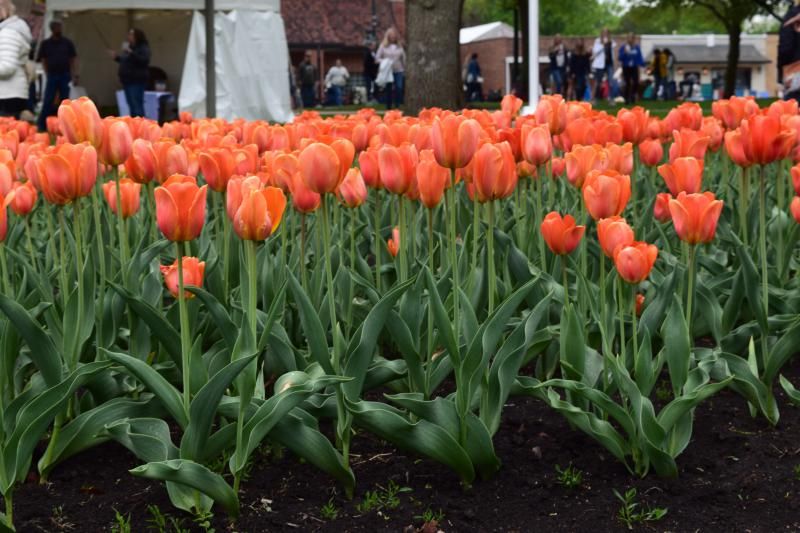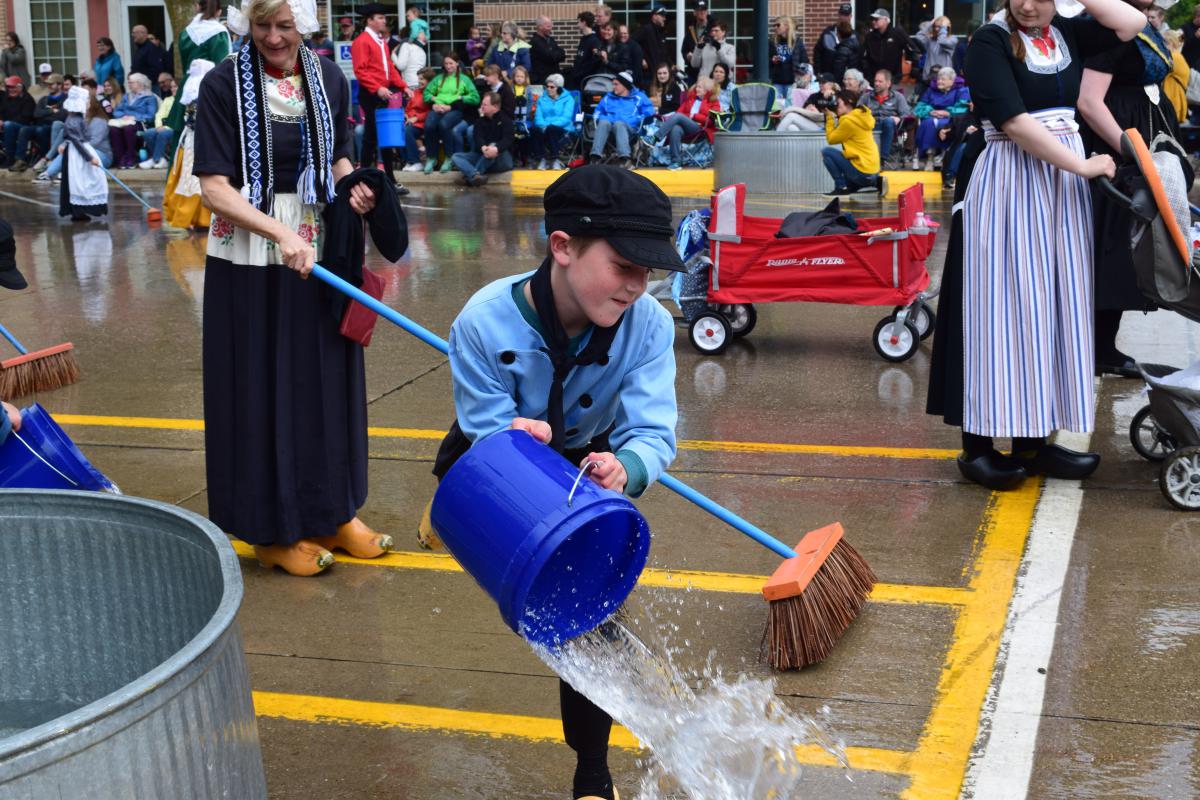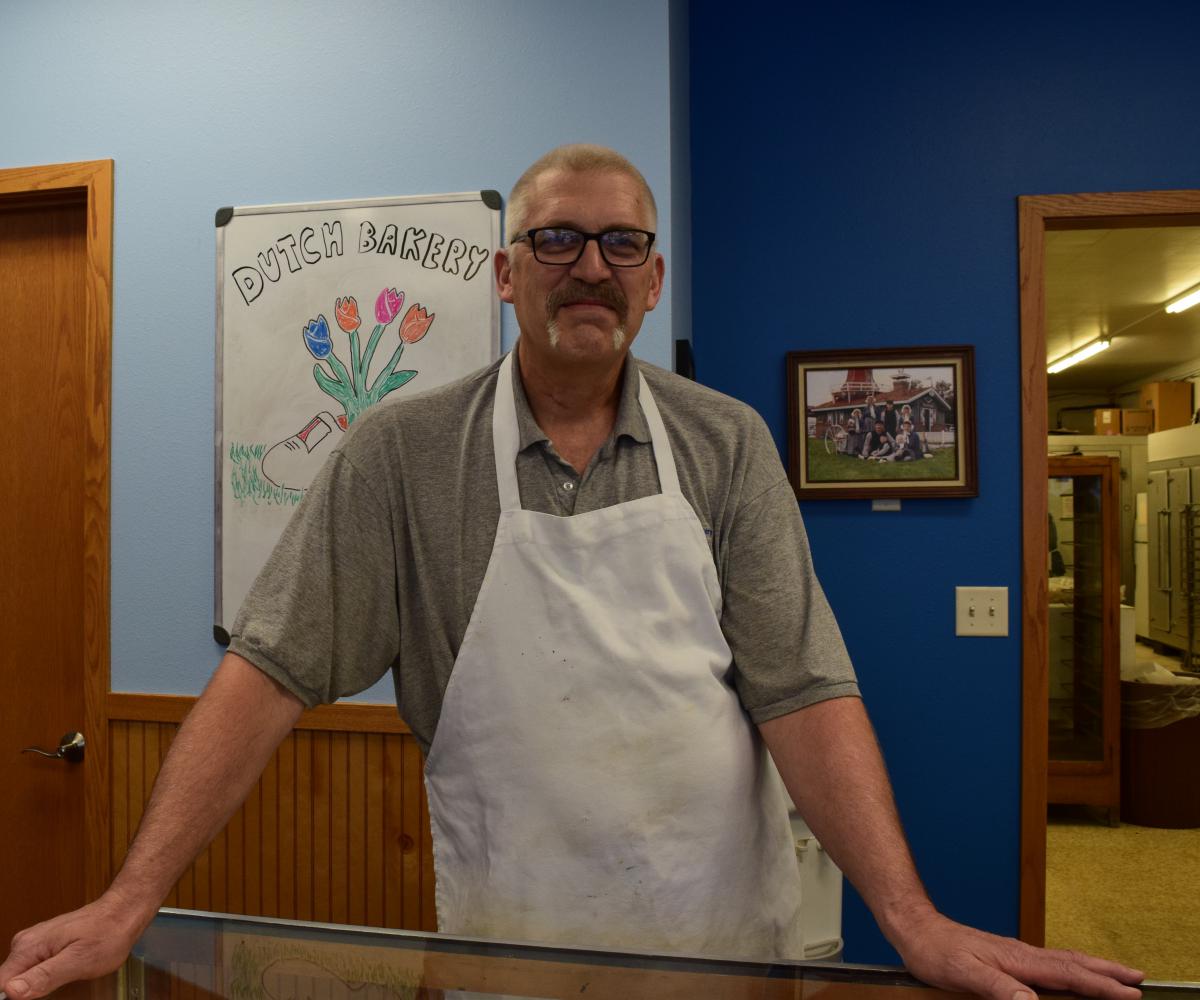
More than 30,000 tulip bulbs are planted in Orange City, Iowa, each year for the Tulip Festival. (KATIE PEIKES / HARVEST PUBLIC MEDIA)
Boys and men, wearing traditional Dutch outfits of black caps, long button-down shirts, black pants and wooden shoes, throw buckets of water onto the street in downtown Orange City, Iowa. Girls and women wear Dutch bonnets and long dresses or skirts while they push brooms on the water.
Locals scrub the street to pave the way for this year’s elected “Tulip Queen” and her court – part of the Orange City Tulip Festival, which celebrates the small northwest Iowa town’s Dutch heritage.

This is the festival’s 80th year, and according to organizers, it draws in at least 80,000 people from around the world. Orange City had planned to mark that milestone last year, but the festival got canceled that spring. And that was a blow to the town of 6,100.
“It was sad,” said Brande Pals, a local who volunteers for the festival. “It was a hard weekend that weekend when it was supposed to be happening. It was nice weather, the tulips were nice, and we just didn’t get to celebrate.”
The Orange City Tulip Festival started in 1936 as a small celebration among Dutch immigrants who missed their homeland. Tulips are a popular flower in the Netherlands and are a symbol of springtime. The festival blossomed into something much bigger and was only canceled one other time: during World War II, from 1942-1946.
Good for business
Mike Hofman, the executive director for the Orange City Chamber of Commerce, said the Tulip Festival is a big gain for the town, but it’s hard to say how big.
“You can’t put a finger on the fact that people come back and experience the small businesses throughout the course of the year, not just during the festival,” Hofman said.
Small businesses, like the Dutch Bakery, make a lot of their yearly income from the festival. The bakery’s owner, Loren Mulder, said the money his business makes during the three-day festival equals about two to three months of normal income.
“It probably makes or breaks our year,” Mulder said. “Without it, it would be more difficult to survive, basically.”
Mulder said last year was tough. After the pandemic forced restaurants and other retail to close, he had to lay off some employees. However, Dutch Bakery did curbside pick-up to stay afloat.

Some food vendors from outside of Orange City say the festival is good for their business too. Cranston Concessions of River Falls, Wisconsin, has been bringing a few food trailers to the festival for more than 30 years. They sell a variety of foods and treats, including chicken wraps, shrimp, malts and Hawaiin shave ice.
When the Tulip Festival, state fairs and other big events were canceled, Joe Cranston’s business took a hit, he said.
“We went from whatever we normally do to zero,” Cranston said.
So Cranston said he’s happy to be back. He coaches women’s hockey at the University of Wisconsin – River Falls and said his hockey players work in his trailers.
“This is their favorite festival to come and work,” Cranston said.
The main attraction
While pastries and other foods are a draw, most people come for the tulips.
More than 30,000 tulip bulbs are planted around Orange City in the fall. By festival time, the bright colored flowers are in full bloom. Tulips are perennials, so they bloom in the spring, die back in the fall, and return the next spring. However, the Tulip Festival treats the flowers as annuals, planting new bulbs every year so they get consistently bright flowers.
Keri Drescher, who owns Tulip Town Bulb Company with her husband, Dan, points out a couple of her favorites in her yard: El Niño, an orange tulip, and Blushing Beauty, a pink tulip with some yellow.
“They always bloom beautifully,” she said.

The Dreschers bought the business and the home it came with in 2017. They run their shop for two months in the spring and two months in the fall.
Tulip Town Bulb Company imports bulbs from the Netherlands and plants 3,000 for the festival. People visit the Dreschers to pre-order bulbs for their yards and gardens. The Dreschers said tulips are popular because they are easy to care for.
“People that can’t garden, you can grow tulips,” Keri said.
“You can plant them completely incorrectly and upside down and they’ll turn themselves over and push themselves through,” Dan said. “They’re pretty resilient.”
Sten Muchow and his family admire the tulips. They moved from Portugal to the U.S. last year and drove an RV six hours from Minnesota to Orange City. Muchow was born in Denmark, and his wife, Sanne, was born in the Netherlands.
“We wanted to get out, and she wanted to come and see this down here,” Sten Muchow said.
Important for the local economy
Orange City isn’t the only town that holds a big festival to salute its Dutch roots. About four hours away, Tulip Time in Pella, Iowa, is a huge economic booster. Pella Historical Society and Museums executive director Valerie Van Kooten said it brings in 2 to 3 million dollars to a 30-mile radius of Pella – to restaurants, hotels and the service and nonprofit industries.
When the festival returned in early May, it saw around 160,000 people. Van Kooten said that’s fewer than a normal year but more than expected.
“And people genuinely seemed to have a great time,” Van Kooten said. “The weather for the most part, until the last day, was very good. We were really happy with 160,000 people.”
Pella, the historical society, local companies and the local college collectively plant about 350,000 tulips for the festival each year. When the festival was canceled last year, the historical society got creative.
“We thought, ‘We can’t just sit here and let them go to waste,’” Van Kooten said.
Van Kooten said they allowed people to dig up tulips for donations. They also delivered 1,000 tulips to nursing homes, shut-ins and members in town. They even sold some tulips to florists.
Besides the decision to share tulips with the community, Van Kooten said last year’s canceled festival had a silver lining for tourism.
“A lot of people realized, ‘Oh wow, if Tulip Time were to go away, it would really hurt this community,” Van Kooten said.
That’s something a lot of towns have realized. Their businesses and sometimes much of their economy depend on these big festivals.
Follow Katie on Twitter: @katiepeikes













